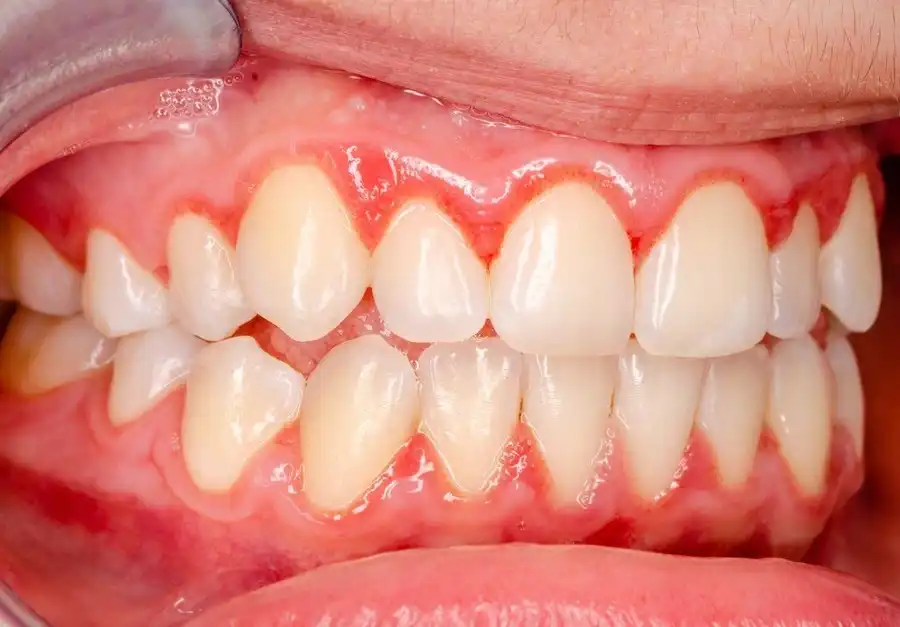11 Reasons Why Your Gums Are Itchy


Symptoms of itchy gums can signal a number of different dental or medical conditions. Although most people know about bleeding gums or gum swelling, having gingiva that itch is less common. But don’t ignore the warning signs. Chances are that the cause is minor. But there are situations where having itchy gums could indicate a serious medical condition, such as an allergic reaction that may be life-threatening.
Since your gums are “mucous membranes” (like your eyes, nose, etc.), they’re more sensitive to stimuli quicker than your skin is. Since they absorb things so quickly, having itchy gums should alert you that something is wrong.
Common Symptoms
Itchiness may present itself on its own. Or it could accompany other symptoms inside of your mouth, such as:
If the source of your itchy gums isn’t isolated to your mouth – but rather something systemic – you might also develop symptoms like fatigue, difficulty breathing, fever, nausea and vomiting, headaches, or itchy areas on other parts of your body. For people who have known food allergies or are having difficulty breathing, seek immediate emergency care.

Common Causes
1) Allergy
Symptoms
Allergic reactions tend to almost always involve some amount of swelling, redness, and itchiness. Remember how your skin responds to poison ivy? It itches! So, when your mucous membranes inside of your mouth are exposed to an allergen, your mouth will itch as well.
Treatment
2) Plaque Buildup
Symptoms
Dental plaque is a mixture of live bacteria and acidic excrements that they create. If too much time goes by between brushing and flossing sessions, it’s only natural for those bacteria to start irritating your gum tissues. One of the earliest symptoms of gingivitis is – surprise – itchy gums. The gums might even itch when you’re brushing and flossing. You’ll likely note additional symptoms like swelling along the edges of your gums and bleeding.
Treatment
3) Hormonal Changes
Symptoms
Women tend to experience changes in their mouth and body more often than men, due to the various hormonal changes that occur during menses, pregnancy, and menopause. For some women, oral symptoms such as irritated gums will develop from time to time. The irritation may be minor or more severe, regardless of how good their home hygiene plan is.
Treatment
Fortunately, hormone-induced gum symptoms like swelling and itchiness tend to go away on their own, as hormone levels stabilize. For instance, a woman may notice her gums are more tender around menses, but symptoms are temporary. Longer periods of inflammation are common during pregnancy, but again, they usually revolve themselves after the mother has given birth.
4) Cut Or Injury | Teeth And Gums
Symptoms
When your body heals itself following some type of cut or injury, some people experience a tingling or itchy sensation in the area immediately around their wound. For example, some people tend to feel itchy gums after wisdom tooth surgery, while their surgical site is starting to heal. The symptoms typically wear off after a few days.
Treatment
Fortunately, your mouth can heal at an amazingly fast pace (again, because it’s covered in mucous membranes.) That’s why things like cuts to your gums or a burn after you’re eating pizza can bounce back so quickly.
Keep the area clean. Rinse regularly throughout the day to remove food particles. Topical numbing medication is ok to use every now and then, but if you need something stronger, ask your dentist about prescribing a “miracle mouthwash”.
5) Itchy Mouth After Eating (Allergies)
Symptoms
Food allergies are a serious condition that can be potentially life threatening. If you have a known food allergy – such as to things like shellfish or peanuts – being exposed can trigger a full-body allergic reaction that starts inside of your mouth. Generally speaking, you’ll feel itchy areas across your tongue, roof of your mouth, cheeks, lips, and in the back of your throat. In serious situations, your airway could close off and you may go into anaphylactic shock.
Treatment
When at all possible, avoid eating foods that you have a known allergy to. If your allergic response is minor, your physician may recommend taking over-the-counter medication such as Benadryl. However, for people with serious food allergies, it’s necessary to call 911 and administer an Epi-Pen, if available.
6) Bruxism
Symptoms
Treatment
Bruxism is usually a condition that requires us having to re-train our jaw muscles or wear a protective splint to prevent them from fully engaging. During daytime bruxing, it’s important to consciously remind yourself of the proper mouth “resting position”. That is, having your lips together, but your teeth apart. Nighttime bruxing is best treated with a bruxism guard or night splint.
7) Dry Mouth
Symptoms
When your mouth doesn’t have enough saliva to keep it lubricated, we call the condition “xerostomia” or dry mouth. The lack of salivary flow can allow irritants to more easily bother your gum tissues and oral mucous membranes. When that happens, it’s easier for your mouth to develop symptoms of burning or itching.
Treatment
Dry mouth treatments usually involve a combination of increased water intake, supplemental moisturizing drops, or toothpaste and mouthwash designed for xerostomia. The key is to keep your mouth lubricated, before you develop tooth decay. You might also need to work with your dentist or doctor to figure out what’s causing your saliva glands to shut down.
Less Common Causes
1) Wisdom Teeth
Symptoms
When teeth start growing in, it’s normal for the gums over them to feel itchy and sore!
Treatment
Rinse with warm salt water to take some of the inflammation out of your gingiva while your tooth is working its way through the gums.
2) Tooth Abscess
Symptoms
Abscessed teeth typically have a small pimple-like fistula on the gums just next to them. You might also notice a salty taste.
Treatment
Endodontic therapy (root canal treatment) is the only way to treat your tooth and avoid an unnecessary extraction.
3) Canker Sores
Symptoms
Aphthous ulcers or “canker” sores tend to create small, round, raw sores in specific areas of your mouth. They may itch.
Treatment
A typical canker sore can usually run its course within 10-14 days. Keep the area clean and avoid irritating the ulcer with food or your toothbrush.
4) Herpes Or Other Viral Infections
Symptoms
Cold sores and other types of herpetic outbreaks usually cause a tingly, itchy sensation before ulcers start popping up.
Treatment
Over-the-counter or prescription antiviral medication can shorten the duration of your outbreak. Laser treatment might also be available from your dentist and works best if administered within the first day or two of the itchy sensation.
Preventing Itchy Mouth
Keeping your mouth clean and free of excess plaque buildup is the best way to avoid itchy mouth. But also, pay attention to what you eat! Read the labels and ask about ingredients to make sure you’re not ingesting something that you’re allergic to. Finally, make sure you stay up-to-date on your dental checkups. Issues like wisdom tooth eruption or a cavity may need some type of intervention before swelling, infection, or itchiness ever start.

Relief At Home
Here’s what to do at home if you’re trying to treat itchy gums:
1) Take an OTC Antihistamine
This option is for people who are experiencing a suspected allergic reaction.
2) Brush and Floss
More than likely, your itchy gums are coming from plaque accumulating along your gumlines. Thorough brushing and flossing are a must!
3) Rinse
Rinsing with warm salt water can help to draw out minor inflammation if your gums are irritated. Antimicrobial mouthwash can also help lift away anything your toothbrush or floss missed.
Overcoming Itchy Gums
Having itchy gums usually means you either have a gum infection, are experiencing an allergic reaction, or there’s an area of irritation that needs your attention. Don’t ignore the warning signs. Work with your dentist to nail down the diagnosis, so that you can treat your itchy gums before it turns into a more serious issue.

Make your inbox smile!
Subscribe






